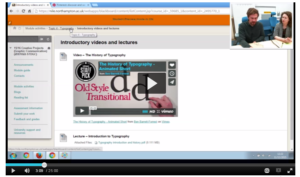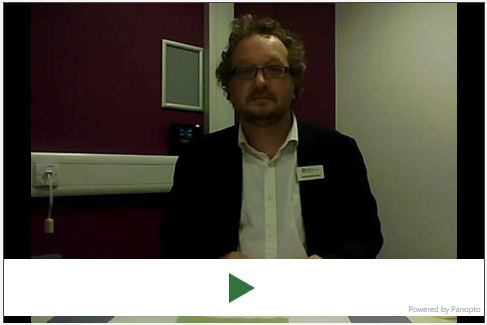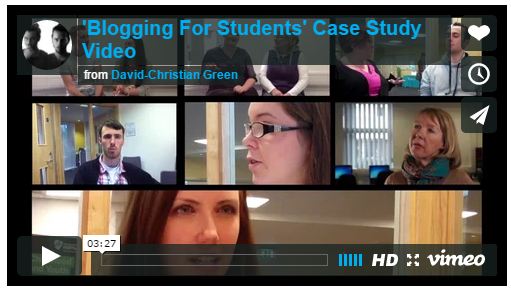In this video James talks through the ways that he has changed his use of NILE to make learning more interactive and to ensure students are better prepared for class.
In this video Sylvie talks about how she has been changing the delivery of academic skills to develop the the level of integration between generic academic skills and subject specific skills. In addition, she explains the process of integrating blended approaches into CfAP’s (Centre for Achievement and Performance) delivery.
In this video Tanya and Claire talk about their work developing e-tivities for their education students in order to provide a pre-sessional activity and inter-sessional activity and a post-sessional activity for students. They share the strengths of the approach including flexibility and accessibility for the students, sharing of staff expertise and the things they have learnt about best practice.
In this video, recorded as part of the S.H.E.D – Sharing Higher Education Designs, James Underwood (Principal Lecturer in Teachers’ CPD) demonstrates an essay planning technique useful at different levels and in different contexts.
This technique is discussed, as mentioned at the end of the video, in the following paper:
Teaching Students at University of Northampton, along with Helen Caldwell (Senior Lecturer in Education) describe how well and how effectively they feel blogging has become a way to record and assess their work.
A short film edited together for Northampton University School of Education.
To watch the video, please click the image below:
In this podcast, Jean Edwards (Senior Lecturer in Education) talks to Jim Harris (Learning Designer) about the module PDT3003 Educational Debates in Learning and Teaching, part of the BA Learning and Teaching, which includes assessed Online Debates using discussion boards in NILE
Please click below to listen to the podcast (duration: 07:32).

In this podcast, Jim Harris (Learning Designer) speaks to Jean Edwards (Senior Lecturer in Education) about the project which aims to investigate the use of mobile technologies in innovative assessment design and guidance, broadening the range of assessment practice to enhance tutors’ and students’ digital literacy.
The objectives of the project are:
- To map the current use of mobile technologies in assessment by staff and explore student perceptions.
- To explore and evaluate three case studies of digitally based assignments across the School of Education.
- To design a digital toolkit to support staff in devising assignments and assignment guidance.
Please click below to listen to the podcast (duration: 07:45).

To find out more about the project, please visit the project website by clicking here.
The Science and Technology in Pedagogy (STRiPe) Research Group was set up to facilitate those working on teaching and learning activities related to science and technology to collaborate. Pedagogy is central to the success of the University, and having a cross-disciplinary and cross-university groups aims to help with this. STRiPe’s aims to take the work members are doing or planning to do with their students, and help with collaboration.
For information about the group, please see the page on the main University website.
Please click this link to access the blog maintained by School of Science and Technology.
In this associated blog post, Matthew Mccormack details the team approach to the redesign of the MA History, and how the use blogs aligned to evidence one of the key subject benchmark statements.
“Our blog assessment fits in with the module’s fortnightly structure. We alternate between ‘classroom’ and ‘online’, with the blog taking place alongside the online seminar: case studies have emphasised the importance of structuring blogging around the rhythm of classes. Every fortnight, the tutor posts up a primary source that relates to the previous class topic, and the students have 500 words per source to blog about it. After 5 fortnightly blogs, the students submit their work for assessment…One of the key ‘History’ skills highlighted in our subject benchmark is ‘an ability to read, analyse and reflect critically and contextually upon contemporary texts and other primary sources’ – so this is an example of how blending the method of delivery can enhance subject skills.”
I used to teach Contextual Studies at the Carmarthenshire School of the Arts. I found a fairly simple way to utilise TEL (Technology Enhanced Learning) through working with Pinterest* as a 21st century equivalent of a visual diary/reflective journal/ sketchbook. In a Level 4 Visual and Material Culture module for Contextual Studies I teamed up with the tutors leading practical modules to create a joint task. Each tutor (theoretical and practical) set up a Pinterest account that demonstrated their aesthetic interests.
Stage one of the tasks was that students reviewed staff sites in order to identify contemporary trends and to evaluate the components of each staff member’s aesthetic (formal elements such as colour palette and conceptual concerns).
Stage two was to create their own boards relating to their own concerns and at least two elements from the lecture programme. The title function on the image can be used to capture short, critical and reflective writing on their selections.
Throughout the module students were expected to share pins and form a ‘visual dialogue’ with each other. They also had to write a short reflection on the development of their aesthetic across the term. The boards, pins, notes, visual dialogue and reflective account then became part of their assessment at the end of the module*1
What is nice about Pinterest is that you can Pin any 2D or moving image so I have also used this in an education context because you can create snapshots of texts, review books, share video case studies etc and comment on them.
*Please note that Pinterest is not a University supported tool and so no targetted staff development training is available. However, it has an extremely user friendly interface and is easy to self-teach.
*1 Due to the fact that Pinterest is an external provider you cannot put students in a position where they would be disadvantaged if they did not use it. My way round this was to allow alternative modes of responding to the task (e.g. the more traditional sketchbook or reflective journal)
Recent Posts
- Blackboard Upgrade – March 2026
- Blackboard Upgrade – February 2026
- Blackboard Upgrade – January 2026
- Spotlight on Excellence: Bringing AI Conversations into Management Learning
- Blackboard Upgrade – December 2025
- Preparing for your Physiotherapy Apprenticeship Programme (PREP-PAP) by Fiona Barrett and Anna Smith
- Blackboard Upgrade – November 2025
- Fix Your Content Day 2025
- Blackboard Upgrade – October 2025
- Blackboard Upgrade – September 2025
Tags
ABL Practitioner Stories Academic Skills Accessibility Active Blended Learning (ABL) ADE AI Artificial Intelligence Assessment Design Assessment Tools Blackboard Blackboard Learn Blackboard Upgrade Blended Learning Blogs CAIeRO Collaborate Collaboration Distance Learning Feedback FHES Flipped Learning iNorthampton iPad Kaltura Learner Experience MALT Mobile Newsletter NILE NILE Ultra Outside the box Panopto Presentations Quality Reflection SHED Submitting and Grading Electronically (SaGE) Turnitin Ultra Ultra Upgrade Update Updates Video Waterside XerteArchives
Site Admin






